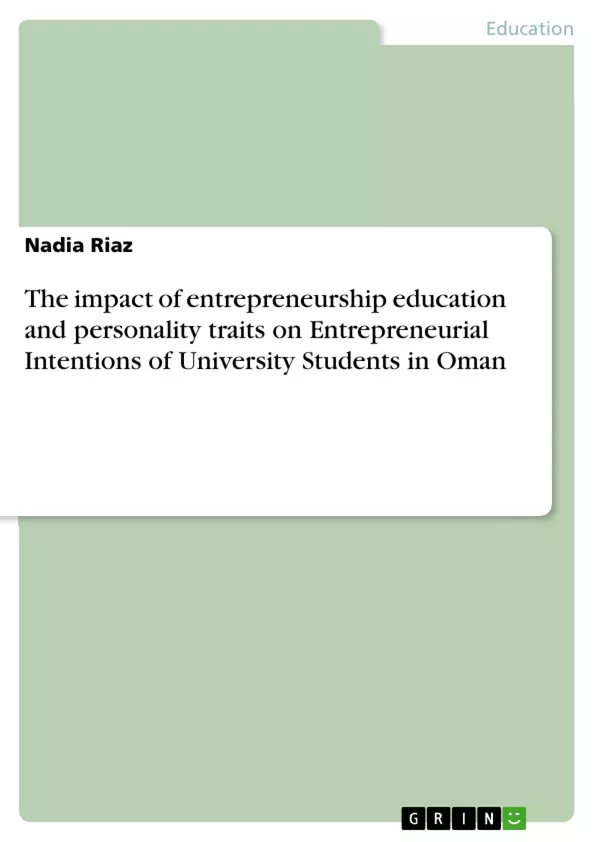This study will discuss the entrepreneurial choices between University undergraduate students and their proactive personality relations. How do the undergraduate students of the University of Oman have business intentions? Do entrepreneurship and proactive personality between university students have a good relationship? Is there a different gender, year, and college status of undergraduate University students?
Both the developed and emerging countries have a universal interest in unemployment. The unemployment rate has risen worldwide, particularly with the recent global collapse. Different global approaches and plans to combat unemployment have been implemented. Entrepreneurship is among the most selected alternatives to unemployment, as the enterprise is increasingly regarded as a major driver of prosperity, creativity, and job creation. But the growth of entrepreneurship and transforming people's attitude towards business is a challenge in virtually all countries.
Inhaltsverzeichnis (Table of Contents)
- Introduction and Background to Research
- Problem statement
- Literature Review
- Theoretical Framework
- Research Hypotheses
- Methodology
- Research Design
- Population and Sample of Study
- Instrumentation
- Instrument Validity
- Instrument Reliability
- Proposed Activities
- References
Zielsetzung und Themenschwerpunkte (Objectives and Key Themes)
This research aims to examine the impact of entrepreneurship education and personality traits on the entrepreneurial intentions of university students in Oman. The study aims to understand the relationship between these factors and their influence on students' decisions to pursue entrepreneurial careers.
- The role of entrepreneurship education in shaping entrepreneurial intentions.
- The influence of personality traits on entrepreneurial aspirations.
- The impact of demographic factors on entrepreneurial intent.
- The moderating influence of gender on the relationship between entrepreneurship education, personality traits, and entrepreneurial intentions.
- The application of the Planned Behavior Theory (TPB) model in understanding entrepreneurial intentions.
Zusammenfassung der Kapitel (Chapter Summaries)
- Introduction and Background to Research: This chapter introduces the research problem, which is the high unemployment rate in Oman, particularly among university graduates. It discusses the country's dependence on oil, efforts to diversify the economy, and the importance of promoting entrepreneurship as a solution to unemployment. It also highlights the existing initiatives and programs aimed at fostering entrepreneurial culture and training in Oman.
- Problem Statement: This chapter elaborates on the global challenge of unemployment and the growing interest in entrepreneurship as a potential solution. It emphasizes the need to understand the factors influencing entrepreneurial intentions, particularly the role of education and personality traits.
Schlüsselwörter (Keywords)
The research focuses on the following key concepts: entrepreneurship education, personality traits, entrepreneurial intentions, university students, Oman, unemployment, economic diversification, Planned Behavior Theory (TPB).
Frequently Asked Questions
What is the main objective of the study on university students in Oman?
The study aims to examine how entrepreneurship education and personality traits influence the entrepreneurial intentions of university students in Oman, particularly in the context of high unemployment and economic diversification efforts.
Why is entrepreneurship education important in Oman?
It is seen as a major driver for job creation and creativity, serving as an alternative to unemployment in a country looking to diversify its economy away from oil dependence.
Which theoretical model is used in this research?
The research applies the Planned Behavior Theory (TPB) model to understand the factors influencing students' entrepreneurial intentions.
What role do personality traits play in this study?
The study investigates the relationship between proactive personality traits and the business intentions of undergraduate students.
Does gender influence entrepreneurial intent according to this research?
Yes, the study examines the moderating influence of gender on the relationship between education, personality traits, and entrepreneurial aspirations.
What specific demographic factors are analyzed?
The research looks at differences in gender, year of study, and college status among undergraduate university students.
- Quote paper
- Nadia Riaz (Author), 2020, The impact of entrepreneurship education and personality traits on Entrepreneurial Intentions of University Students in Oman, Munich, GRIN Verlag, https://www.grin.com/document/1021320



